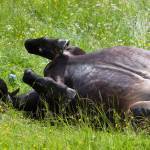Incidence of Colic Among Horses After Routine Gastroscopy

When it comes to diagnosing gastric ulcers in horses, one procedure outranks all others: gastroscopy.
For veterinarians, gastroscopy is a straightforward procedure: a videoendoscope is passed through the throat, eased down the esophagus, and maneuvered around the stomach. Effective sedation makes the procedure a safe one. Infrequently, however, colic occurs after gastroscopy. Researchers in England set out to determine the prevalence of colic in the two days following gastroscopy.*
The researchers reviewed records from two equine clinics over a five-year period. In total, 436 horses underwent 573 gastroscopies during the study period. More than a dozen breeds were represented, and the ages of horses ranged from 1 to 30 years old.
Reasons for gastroscopy were noted in the records and included investigation of acute or chronic colic, exercise intolerance, girthing issues, and miscellaneous clinical signs, such as lethargy, poor hair coat, inappetence, and weight loss.
Of the 573 gastroscopies, 17 (2.9%) ended in colic within 48 hours of the procedure; 16 cases were considered mild and responded to conservative treatment but one case required two subsequent abdominal surgeries, eventually resulting in euthanasia related to lipoma. Colic was attributed primarily to gastric impaction in 12 of the 17 colic cases.
Equine gastric ulcer syndrome (EGUS) was identified during 327 of the examinations. The horses in the study represent a wide swath of the demographic and prove that gastric ulcers remain a problem in many horses.
“Once diagnosed with EGUS, horses are generally prescribed omeprazole to heal the gastric mucosa and return the stomach to a healthy state,” said Catherine Whitehouse, M.S., a nutrition advisor at Kentucky Equine Research. “As the end of the omeprazole treatment nears, a research-proven digestive supplement designed to keep new ulcers from forming should be started.”
Ulcer-prone horses are often maintained on an antiulcer supplement for optimal health. If considerable change in management is made, such as transitioning a stabled performance horse onto full-time pasture, the supplement may be discontinued after the horse has become completely accustomed to his new routine.
Some horses, though, will need an antiulcer supplement even when on pasture. “Veterinarians and researchers once thought that horses with all-out access to pasture were invulnerable to gastric ulceration, but studies have proven this to be untrue, so it’s a good idea to keep a close eye on ulcer-prone horses and to supplement when necessary,” Whitehouse suggested.
*Spanton, J.A., L. Smith, and T.S. Mair. 2020. A clinical audit of the prevalence of colic in the 48 hours after gastroscopy in 436 horses. Equine Veterinary Education 32 (Suppl. 11):12-15.








